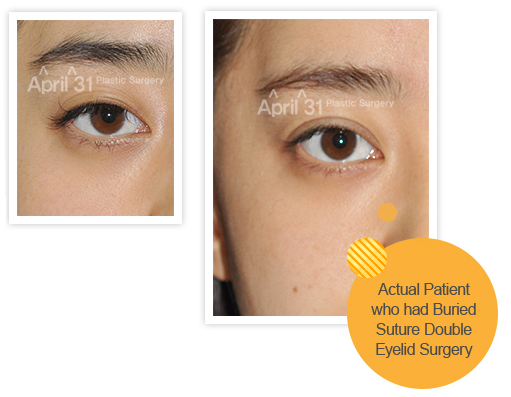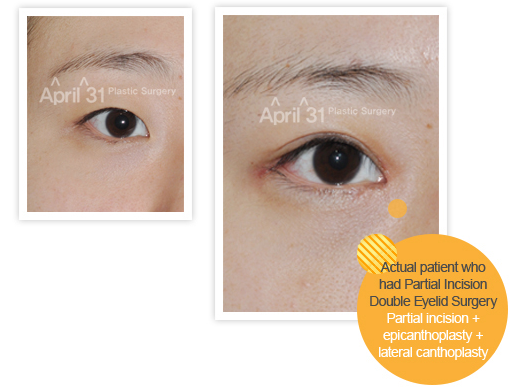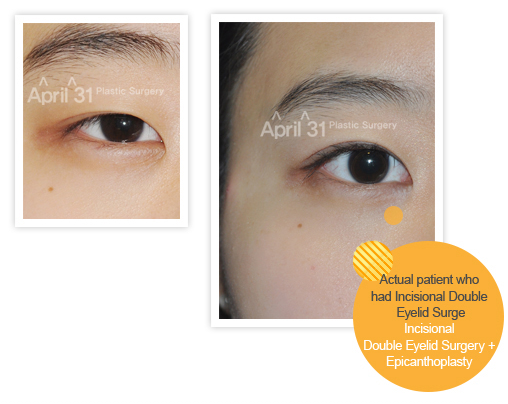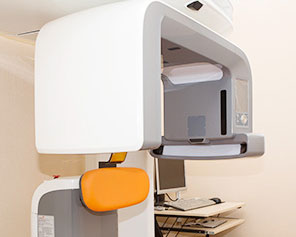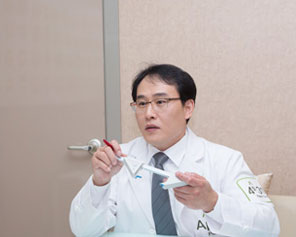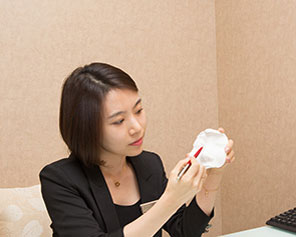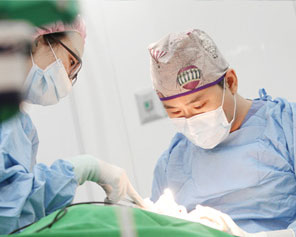
◆ Surgical information
Specialized surgeon: Dr. Won Suk Oh
Anesthesia :IV Sedation + Local Anesthesia
Post operative treatment visits : 3-4 times
Stitch removal :3-5 days after
Recovery Care : Bruising and swelling care
◆ Different types of Eyelid Surgery
| 01. Non-incision Double eyelid Natural-looking, well-defined double eyelid folds can be made without incision on the thin eyelid that has not a large amount of fat. This procedure is relatively simple using a 1- to 2-mm suture. Even though you close your eyes, no trace of surgery is found on the upper eyelid. *Actual patient of Buried Suture Double Eyelid Surgery |
| 02. Partial incision Double eyelid As a combination of non-incision and incision method, this procedure has strengths of the two techniques. The shape and length of incision is adjusted depending on the eyelid conditions of individual patient, and this surgery is effective for muscle resection, under-eye fat removal and correction of slight ptosis. This partial incisional technique makes the outer double eyelid fold distinctive and inner fold softer, and it produces a good result to young women. *Actual patient of Partial Incision Double Eyelid Surgery-Partial incision + epicanthoplasty + lateral canthoplasty |
| |
| 03. Incision Double eyelid The procedure uses an incision along the desired double eyelid fold. Orbicular muscle of eye is partially resected and connected to skin or muscle (tarsal plate or levator palpebrae superioris muscle) using suture thread, and consequently double eyelid folds and well-defined eye shape were made. April 31 Plastic Surgery Clinic applies dynamic double eyelid surgery technique that produces natural look and leaves an invisible scar on the upper eyelid. *Actual patient of Incisional Double Eyelid Surgery- Incisional Double Eyelid Surgery + Epicanthoplasty |
|
◆ Candidates for Double Eyelid Surgery
Non-incision method |
Partial Incision method |
Incision method |
√ Those who have thin eyelid without large amount of fat √ Those who don't have severe eyelid sagging √ Those who want a natural-looking eye shape without scar |
√ Those who are a candidate for Buried Suture Double Eyelid Surgery but have partially developed sagging on eyelid skin √ Those who had Buried Suture Double Eyelid Surgery but whose double eyelid folds came undone. √ Those who have a large amount fat in eyelid |
√ Those who have severe skin sagging on eyelid √ Those who have a large amount of fat on eyelid and around the eyes √ Those who had Buried Suture or Partial Incision Double Eyelid Surgery and whose double eyelid folds came undone √ Those who want to have revision surgery, which is generally performed using incisional method |
◆ Comparison of each surgical method
Non-incision method |
Partial Incision method | Incision method |
Point 01 Fast recovery time (3 – 4days only) Because the initial postoperative swelling disappears in 4 to 7 days after surgery, office workers can have surgery on Saturday afternoon and go to work on Monday without taking a leave of absence.
Point 02 Well-Defined, Natural-Looking Double Eyelid Fold! Dynamic technique leaves no mark on upper eyelid and creates natural-looking double eyelid folds.
Point 03 Short Surgery Time! The procedure takes only 10 to 30 minutes
Point 04 Invisible Scar and Fast Recovery! Surgical manipulation to eyelid tissue is minimal resulting in reduced swelling and fast recovery. |
Point 01 Well-Defined Eye Shape Using Advantages of Both Buried Suture and Incision Method
Point 02 Distinctive and Natural-Looking Double Eyelid Fold
Point 03 Eye Shape Design through 1- to 2-Point Partial Incision Depending on Individual Condition
Point 04 No Scar and No Excessive Swelling | Point 01 Correct asymmetry of eyes
Point 02 Have a low risk of double eyelid fold coming undone
Point 03 Enable to freely design double eyelid folds
Point 04 Prevent excessive swelling by removing loose skin and thick fat |
◆ Surgical Method of Dynamic Incisional Double Eyelid Surgery
Complete Natural-Looking Eye Shape with Precise and Safe Method | |||
01. Non-incision Double eyelid Continuous Buried Suture Our Eyelid Surgery Specialist Uses Various Buried Suture Techniques Depending on the Eyelid Conditions of Individual Patient. This is the most common buried suture technique that makes continuous loops between skin and tarsal plate through the skin or conjunctiva. April 31's buried suture double eyelid surgery, which uses a 1- to 2-mm suture and is performed by experienced specialist, can't be noticed by looking at the bare eyelid skin. It is good to have double eyelid surgery in any clinic? The successful double eyelid surgery depends on the surgical technique and aesthetic view of an experienced surgeon. At April 31 Plastic Surgery Clinic, Dr. Won Suk Oh, who has profound clinical experience and accumulated surgical know-how, performs all eyelid surgery including buried suture double eyelid surgery. Non-Incision Method Leaving No Mark on Upper Eyelid | |||
02. Partial incision Double eyelid Partial incision is made in a 1-to 2-point size depending on the conditions of individual patient.
| |||
03. Incision Double eyelid Incisional method takes a longer time to settle than buried suture method and is likely to leave a scar on the upper eyelid. However, the new Dynamic Double Eyelid Surgery reduces recovery period and surgery scar, overcoming the weaknesses of incisional method.
Difference between Regular Incisional Method vs Dynamic Technique Regular Incisional Method – Static Double Eyelid Surgery Double eyelid folds made through regular incisional method show clear, large surgery scars, and excessive swelling on the upper eyelid is accompanied resulting in an artificial look. Dynamic Technique- Dynamic Double Eyelid Surgery Using the principle of how natural double eyelid folds are formed, this procedure ties micro-muscles and skin, and produces natural-looking double eyelid folds and invisible scar while using an incision. |
◆ April 31's Actual Eyelid Surgery Patient







◆ Treatment Plan
|
|
|
|
01. Examine facial Structure and condition through medical scanning | 02. Consult with Eyelid Surgery Specialist Dr. Won Suk Oh | 03. Devise a surgery plan suitable for each patient |
04. Perform surgery and monitor recovery |






